The lovely Trinco in the blissful Thai Pongal
By Dhaneshi Yatawara in Trincomalee
|
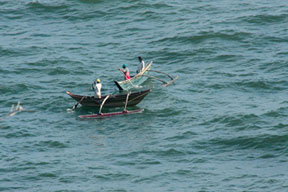
Pix by: Kavindra Perera
|
It was just one day ahead the festivities when we reached Trincomalee
last Monday. The deep blue waters and the marble like beaches were
picturesque. Blessed with such beauty, Trincomalee, along with all its
glory was getting ready to enjoy the beginning of the year as the Hindus
believe. The city was as normal as any other developing township.
With the farthest efforts of the Tri Forces and the Police,
Trincomalee is safe, peaceful letting the people living there blend in
pleasantly and consistently. The kovils in and around the city were
getting decorated with bright colours and ornaments - a glimpse of the
peaceful mind of the citizens.
The 412,547 (approximately) people living in the Trincomalee district
consists of almost an equal number of people of all three communities,
the Sinhala, Tamil and the Muslims.
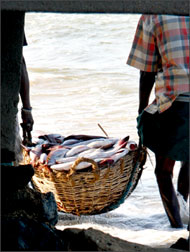 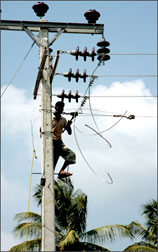 The Koneshwaram Kovil or rightly known as the Thirukoneshwaram temple
was getting ready to welcome the awakening of gods and bring their
blessings to the common people. Situated at the top of a rock the kovil
is blessed with a scenic beauty. Standing at the edge of a rock, a
devotee would definitely feel the blessing reaching him or her from the
heaven up above. The sea waves splashing against the hard rocks, the
spot where the 'Ranmuthuduwa', of the box office hit Sinhala cinema was
filmed, long stretches of sea and beaches would definitely make any Sri
Lankan blissful and devoted. The Koneshwaram Kovil or rightly known as the Thirukoneshwaram temple
was getting ready to welcome the awakening of gods and bring their
blessings to the common people. Situated at the top of a rock the kovil
is blessed with a scenic beauty. Standing at the edge of a rock, a
devotee would definitely feel the blessing reaching him or her from the
heaven up above. The sea waves splashing against the hard rocks, the
spot where the 'Ranmuthuduwa', of the box office hit Sinhala cinema was
filmed, long stretches of sea and beaches would definitely make any Sri
Lankan blissful and devoted.
Thanks to our brave soldiers of Army, Navy, Air Force and officers of
the Police, Trincomalee holds a peaceful and a secured environment for
the civil administration to function. The Governor, Rear Admiral Ashan
Wijewickrema and the District Secretary Maj. General (Rtd.) T.T.R. de
Silva, with their understanding of the military situation and a sound
knowledge of the area for over many years of service as Naval and Army
officers enable the civil administration to function without
interruption. According to Maj. Gen. de Silva, the statistics show only
a slight change in the number of people over the years meaning that the
people who were living in the area have not changed their traditional
lands.
The city and the suburbs are totally accessible to anyone. There is
checking of vehicles and people moving in and out of the town limits, if
not, the safety of the area can not be guaranteed as Trincomalee spreads
towards the recently liberated Verugal in the south, the north towards
Yan Oya and the West by Hathares Kotuwa in Habarana and the East, of
course, by the deep blue sea, the Bay of Bengal. "During the 90's the
southern side of Trincomalee was heavily disturbed with occasional
tremors caused by the LTTE. Particularly, the Verugal Division became a
place where an average Government servant can not carry on with his
duties without LTTE interfering in their work," Maj. Gen. de Silva
added.
Thai Pongal
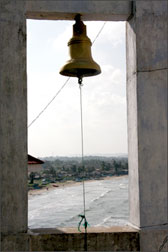 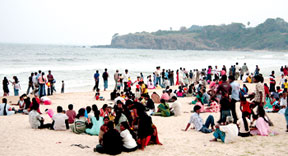 The Hindu chief priest of the Thirukoneshwaram Kovil, Sivasri
Sivakuha Kurukkal was peacefully getting ready along with his team to
start the year according to their beliefs. "It is absolutely necessary
to perform these rituals with devotion and belief as the kovil is the
channel for the gods's blessings to reach the common mass," the priest
added. The Hindus believe with such devotion the gods will bless the
believers throughout the year. "Thai Pongal does not bless Hindus alone.
It is for everyone in the entire country. We worship the Sun, as he is
the creator of the world," the chief priest carried on explaining their
devotion and commitment. The Hindu chief priest of the Thirukoneshwaram Kovil, Sivasri
Sivakuha Kurukkal was peacefully getting ready along with his team to
start the year according to their beliefs. "It is absolutely necessary
to perform these rituals with devotion and belief as the kovil is the
channel for the gods's blessings to reach the common mass," the priest
added. The Hindus believe with such devotion the gods will bless the
believers throughout the year. "Thai Pongal does not bless Hindus alone.
It is for everyone in the entire country. We worship the Sun, as he is
the creator of the world," the chief priest carried on explaining their
devotion and commitment.
Talking about the security for them to carry their traditions in the
area the chief priest could have been the happiest person. On the day of
the festival, soldiers, police officers, sailors and airmen were there
at the kovil throughout the day to get the blessings of the gods for
protection. Irrespective of race, caste or creed, profession or age, the
blessings reach everyone through the holy shrine.
Very early in the morning around five the priests commence their
rituals and by around 6 to 6.30 a.m. people make their trek to the
temple after performing their house rituals. Everyone was neatly and
gaily dressed giving the beginning of the year, a fresh back drop.
In the evenings people with their families were gathering at the
beach to bask in the evening sunshine. The same evening there were
hundreds of willing crowd, young and old, gathered on the beautiful sea
shore artfully designed by nature for the people to spend time and
enjoy. Many local tourists were there as well. It was a wonderful sign
since, myself, a 'foreigner' in their land from Colombo, was under the
impression that the town becomes desolate during the evenings, even on
special days.
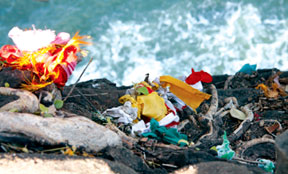 For years there were no discrimination shown by the military.
Officials confirm this situation and the commander ensures strick
discipline among on the Tri forces and the police, especially during
turbulent times. For years there were no discrimination shown by the military.
Officials confirm this situation and the commander ensures strick
discipline among on the Tri forces and the police, especially during
turbulent times.
The administration and the military control goes hand in hand in
Trincomalee. Even after the Government declaring the abrogation of the
Ceasefire Agreement, life in Trinco was going on regardless with its
day-to-day life without interruption.
On Wednesday, the 16th of January
The day started as usual for Trincomalee with its natural beauty with
the light breeze breathing from the bay.
Every eye of this island nation has now turned towards Velupillai
Prabhakaran and his marauding killer gang. Trinco, naturally, was tensed
up a little. But people carried on with their day-to-day life. The
assurance of a secured environment, given by the Army and the Police,
should be highly appreciated. Not a single incident was reported in
Trincomalee and the outskirts during that tense fourteen days after the
announcement of the abrogation. Sri Lanka Army, Navy and the Air Force
protected the land, air and the waters of Trincomalee.Speaking to
several ground commanders of the Army about the immediate past, they
were happy to note that there were no violations against the public by
the security personnel. Amidst the tight security people went about
their ways. "We have made the area safe for people to come and invest
in," the Military assures. The military forces are capable of
eradicating terrorism and consolidating the Government control of the
area and leave the rest in the hands of the public administration and
the common people of the country.
People of Trincomalee
They seem to be getting along with their normal chores on with their
lives just as we all do in the rest of the country. Since we reached
Trincomalee on a late afternoon the schools were closed. And on the 16th
- the 'D Day' for the Ceasefire Agreement - many schools functioned even
in the remote villages.
Resettlements are in full swing. According to the District Secretary
only 1626 families still await for resettlement. "Building houses for
the tsunami affected families was delayed for no other reason other than
due to false promises given by many non governmental organisations. Some
of them had abandoned their projects and left the country," he added.
Those families that are awaiting resettlement are residents of Sampur
area that has now been declared a high security zone. The Government has
already allocated two plots of land to build two housing schemes for
these people. These new locations is just seven kilometres from their
original place of abode, the officials added. The project is
continuously in progress with high priority, District Secretariat
states.
Kadiraman Manoranjan now happily lives resettled in his own plot of
land, which of his ancestors. So do his relatives and neighbours in the
village, Kalladi. "During the time of LTTE rule we had to wed our
children at very young age. If not Tigers would forcefully take away our
children," he said. Proving his story we witnessed while we walked
around the village that many couples were quite young. That is the past
and now people are safe and happy though the past do hold many dark
moments in their lives.
These areas are now emerging. When we were there the Ceylon
Electricity Board technicians and workers were laying power lines - to
provide electricity to many villages in that area.
Antony Douglas and Winston Fernando who are originally from Chilaw,
have put up their 'wadiya' along the coast close to Kalladi. They and
their group of ten people have been fishing there since August last
year. "We are very safe here. Our brothers in the Army have secured the
area and thus letting us to do our job peacefully. And it is less
expensive to live here. Now anyone can come and start fishing if they
want to," they said. Traders from many cities in the vicinity of
Trincomalee come to these areas to buy their catch. "Even the fishermen
in the resettled areas are joining us or to go fishing on their own,"
they added.
Buddhist mark of Trinco
We met Ven. Bandarawela Sumedha Thero at the Lankapatuna temple - the
first Buddhist priest to set foot on this temple after 800 years. The
temple all is revered with veneration as it is the sacred place where
the Sacred Tooth of Lord Buddha was first brought in from India. This is
the spot, as the history quotes, where Princess Hemamala and Prince
Dantha reached the Sri Lanka shores carrying the Sacred Tooth of Lord
Buddha safely.
Ven Sumedha Thero had arrived at the Lankapatuna temple in January
last year. "During the Poya days, 2000 - 3000 people come throughout
that day. And during the weekends approximately 500 people visit the
temple," the thero added. For the past two months, due to the disturbed
situation, number had dwindled. The residence for the priest has been
built by the soldiers of the Sri Lanka Army.The area is now safe for
archaeological expeditions and it is the duty of the relevant officials
to declare this site as a sacred area and protect it for the future
generation.
The Welgama Rajamaha Viharaya in Kanniyawa under Ven Ampitiye
Seelawansa Tissa Thera has established a harmonious link between the
villagers and the temple. Ven Seelawansa Thera runs the village with the
help of the security provided by the Sri Lanka Army. The area, once an
LTTE stronghold, now is resettled with the decendents of the original
owners of the village.The land that belongs to the temple is strewn with
stone inscriptions of Tamil and ancient Sinhala letterings and many
ruins of the previous temple buildings that was built during King's
reign. The efforts taken by the chief priest to protect this invaluable
archaeological site should be highly appreciated.
The development
During 2007 under the 'Gama Neguma' programme 24 million rupees were
allocated for the development of the Trincomalee district, Maj. Gen. de
Silva added.
The funding covers a wide range of developments in irrigation
development, water and electricity supply, community resources
development, religious affairs, fisheries, sports etc. The bus stop, two
new market places are under construction. Trincomalee is free from
terrorist threats and safety is fully consolidated in the area. And now
it is the time for civil administration to take command. The era can be
brought back, where people from all over this island nation visited
these areas on pilgrimages. Trincomalee is very precious to Sri Lanka
and it is the duty of all its citizens to protect and preserve it.
[email protected]
|
